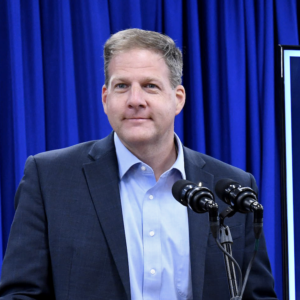If New Hampshire gets the anticipated Hassan v. Sununu U.S. Senate race next year, you can expect to hear both candidates dropping the “B” word: “Bipartisan.” In fact, they’ve already started.
On Monday, Sen. Maggie Hassan was touting a report from the Lugar Center at Georgetown University naming her the seventh most bipartisan senator. “There’s a lot to get done in Washington — and I’ll continue working across the aisle to make it happen. Proud to be named the 7th most bipartisan senator,” she tweeted.
The next day, Gov. Chris Sununu used a radio interview to call out President Joe Biden and D.C. Democrats for their lack of bipartisanship.
Senate Republican Leader Mitch McConnell’s (R-Ky.) said Monday, “I don’t think there will be any Republican support — none, zero — for the $4.1 trillion grab bag which has infrastructure in it but a whole lot of other stuff.” Asked about that comment by WGIR-AM radio host Chris Ryan, Sununu put the blame squarely on Biden.
“This is Joe Biden’s bill. He has made zero attempts to find bipartisanship,” Sununu said. “The 50 Republican senators down there, they’re not all extremists. And you know, there’s a lot of folks that want to find that middle ground down there. And there’s a lot of opportunity to do that. [Biden] has tried zero. They haven’t even attempted it.”
“It’s a Joe Biden bill. It’s an AOC bill. It’s a Green New Deal bill,” Sununu added. “Let’s focus. Let’s have some fiscal discipline.”
In February, a group of 10 GOP senators, led by Susan Collins of Maine, went to the White House to speak with Biden on a trimmed-down version of his massive $1.9 trillion spending proposal. They countered with an estimated $618 billion proposal of their own and expected both sides to give concessions to come to a bipartisan agreement.
Instead, Biden ignored their proposal and pushed forward with his own package, which eventually passed on a partisan basis in the Senate, with the support of both of New Hampshire’s senators.
As governor, Sununu has enjoyed strong support outside his own party. Not only does he have a high job approval rating among independents (74 percent), his approval among Democrats (56 percent) is higher than Hassan’s among all voters (49 percent.) He also won a 30-point victory over his Democratic opponent in the same election where Joe Biden carried New Hampshire by seven points.
Not surprisingly, then, Hassan is pushing her bipartisanship message hard to close the gap. Nearly every day her office sends out a press release with the word “bipartisan” in the title — sometimes several in a single day.
Meanwhile, according to ProPublica, Hassan only votes against Senate Democratic Leader Chuck Schumer and her fellow party 1.7 percent of the time. Perhaps more importantly, Hassan has stuck with her fellow Democrats when her single vote mattered, as in the $1.9 trillion Biden spending package passed using reconciliation.
Sununu also suggested Biden’s fast-track approach is also hurting the cause of bipartisanship.
“Remember: it’s May. He’s only been president for four months and they’re already going after $6 trillion? I think maybe the Republicans are also saying, ‘Look, we can find some common ground, but we don’t know where the needs of America are right now beyond what’s already been approved.’ Let’s make sure we’re addressing the real needs.
And the fact that [the White House] is saying, ‘Well, here’s a $4 trillion bill, take it or leave it’ — because they can just steamroll over the Republicans because they have the majority in both houses — that’s not bipartisanship.”




